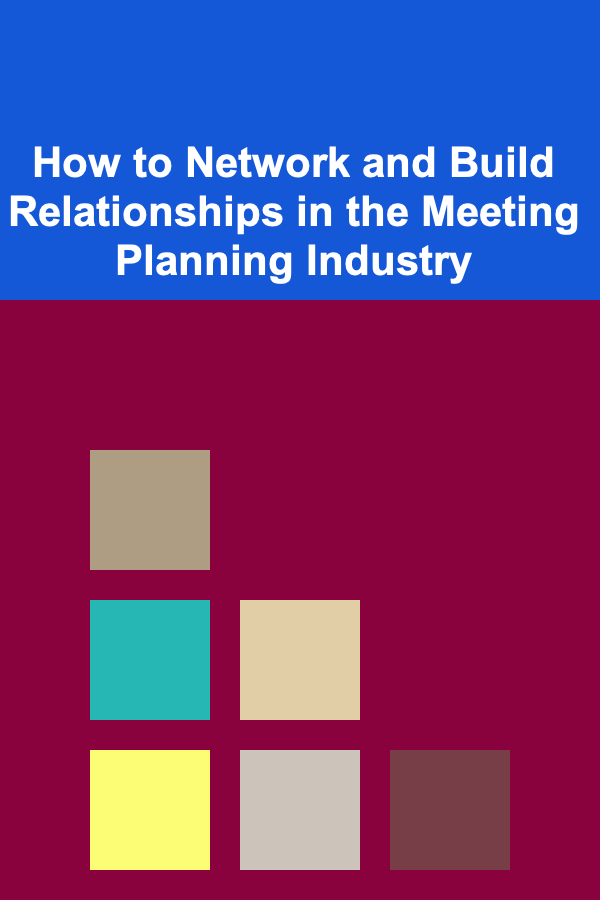
How to Network and Build Relationships in the Meeting Planning Industry
ebook include PDF & Audio bundle (Micro Guide)
$12.99$11.99
Limited Time Offer! Order within the next:

Networking and relationship building are essential components of success in any industry, but in the meeting planning industry, they are particularly crucial. As a meeting planner, you're not only coordinating logistics and managing budgets but also connecting people, vendors, and organizations. Building a strong network allows you to access new opportunities, gain industry insights, and establish trust with key stakeholders. In this actionable guide, we will explore effective strategies for networking and relationship-building that will help you thrive in the meeting planning industry.
Why Networking is Crucial in the Meeting Planning Industry
Before diving into the practical steps, it's important to understand why networking and building relationships are so important in this field.
- Access to Resources: Networking opens the door to a wide array of resources, including vendors, venues, technology providers, and other essential services. Whether you're planning corporate events, conferences, or weddings, having the right contacts can make all the difference in delivering a successful event.
- Industry Knowledge: The meeting planning industry is constantly evolving. By networking with peers and colleagues, you can stay updated on industry trends, best practices, and new technologies that can enhance your events.
- Referral Opportunities: Building relationships with clients, vendors, and partners leads to word-of-mouth referrals. Satisfied clients will recommend you to others, and the more you connect with industry professionals, the more opportunities you'll have for future collaborations.
- Collaboration and Partnerships: A robust network facilitates collaboration. By working with trusted partners, you can offer a wider range of services to your clients, which can help you stand out in a competitive market.
How to Build and Expand Your Network in the Meeting Planning Industry
Networking effectively requires strategy, persistence, and a proactive approach. Here are the key actions to take in order to build a meaningful and lasting network in the meeting planning industry:
1. Attend Industry Events and Conferences
Industry-specific events and conferences are prime opportunities to meet new people, learn about industry trends, and gain exposure. These events often feature keynotes, breakout sessions, and networking opportunities designed to bring professionals together.
- Actionable Tip: Set specific networking goals before attending. For example, you might aim to meet three new vendors or introduce yourself to at least five potential clients.
- Actionable Tip: Don't just focus on your immediate needs---take time to learn about others' businesses. This will help you identify opportunities for mutual collaboration.
- Actionable Tip: Follow up with the people you meet at events. Send a LinkedIn request or email within 24 hours to solidify the connection.
2. Leverage Social Media and Online Platforms
In today's digital world, social media is a powerful tool for building relationships. Platforms like LinkedIn, Instagram, and Twitter can help you stay connected with industry professionals, engage in conversations, and showcase your work.
- Actionable Tip: Regularly post content related to event planning, such as tips, client success stories, or industry insights. This helps position you as an expert and makes you more approachable to potential collaborators.
- Actionable Tip: Join LinkedIn groups or Facebook groups dedicated to meeting planners and event professionals. Engage in discussions and share your experiences.
- Actionable Tip: Participate in Twitter chats or industry hashtags. By joining conversations around event planning trends or challenges, you can meet other professionals who are actively engaged in the industry.
3. Volunteer for Industry Committees and Associations
Many industry associations and organizations offer committees or volunteer opportunities that allow you to become involved in the event planning community. Volunteering gives you access to industry leaders and creates visibility for your skills and expertise.
- Actionable Tip: Research organizations like Meeting Professionals International (MPI), the Professional Convention Management Association (PCMA), or the Event Industry Council (EIC). These associations offer excellent networking opportunities and are often the source of educational events and industry certifications.
- Actionable Tip: Volunteer for leadership positions within these groups. Not only will this expand your network, but it will also increase your credibility within the industry.
4. Focus on Building Long-Term Relationships, Not Just Transactional Interactions
In the meeting planning industry, relationships are built over time. It's important not to focus only on immediate gains, such as booking a client or securing a vendor contract. Building long-term relationships will lead to more sustainable success.
- Actionable Tip: Take time to understand the needs and goals of your contacts. Rather than immediately pitching your services, listen to their challenges and offer advice or insights that demonstrate your expertise.
- Actionable Tip: Maintain regular communication with your network. Reach out periodically with helpful information, industry updates, or just to check in. Personal connections, such as wishing someone a happy holiday, can go a long way in maintaining relationships.
5. Be a Resource to Others in Your Network
Networking is a two-way street. To build strong relationships, you need to be a valuable resource to others. This means offering your knowledge, making introductions, and helping people whenever possible.
- Actionable Tip: If you come across an article, podcast, or event that could benefit someone in your network, share it with them. This shows that you care about their growth and success.
- Actionable Tip: Offer to introduce people who might benefit from knowing each other. For example, if you meet a vendor that a colleague is looking for, make the introduction.
- Actionable Tip: Help others even if there's no immediate gain for you. When you demonstrate generosity, others will naturally be inclined to help you in return.
6. Develop Relationships with Vendors and Suppliers
The vendors and suppliers you work with play a crucial role in the success of your events. Building strong, mutually beneficial relationships with these professionals ensures that you get high-quality services and preferential treatment when needed.
- Actionable Tip: Take the time to understand your vendor's business and what makes them successful. When you know what they value, you can tailor your requests and build a stronger working relationship.
- Actionable Tip: Always communicate clearly and professionally. Show respect for their time and expertise, and never hesitate to express appreciation for their services.
- Actionable Tip: As you establish relationships with trusted vendors, ask them to recommend others they have worked with. Expanding your network of trusted suppliers and service providers can help you offer better services to your clients.
7. Foster Relationships with Clients
Building relationships with clients is not only about ensuring their event goes smoothly. It's about developing trust and demonstrating that you have their best interests at heart. Happy clients are more likely to refer you to others and bring you repeat business.
- Actionable Tip: Communicate with your clients frequently during the planning process. Regular updates and check-ins will help keep them engaged and informed.
- Actionable Tip: After the event, ask for feedback. This shows that you value their opinions and helps you improve your services in the future.
- Actionable Tip: Follow up with clients after the event with a thank-you note or email. Building personal connections beyond the event itself will help you establish a loyal client base.
Common Networking Mistakes to Avoid
While networking is vital, there are some common mistakes that professionals often make. Avoid these to ensure that your efforts are fruitful:
- Focusing Only on Short-Term Gains: Networking should not be about immediate results. Building genuine, long-term relationships is the key to long-lasting success.
- Being Too Sales-Oriented: Avoid making every conversation or interaction about selling your services. Take time to listen and offer value before pitching your offerings.
- Neglecting Follow-Up: The work doesn't end once you've made a connection. Always follow up with people you meet at events or online, and keep in touch regularly.
Conclusion
Building a strong network and establishing lasting relationships is crucial for success in the meeting planning industry. By attending industry events, leveraging social media, volunteering, and being a resource to others, you can grow your network and create meaningful connections. Focus on developing long-term relationships with vendors, clients, and industry peers, and remember that networking is about giving as much as it is about receiving. Stay proactive, be genuine, and the relationships you build will not only help you grow your career but will also position you as a trusted professional in the meeting planning community.
Reading More From Our Other Websites
- [Home Holiday Decoration 101] How to Decorate Small Spaces for the Holidays with Vertical Decor
- [Home Maintenance 101] How to Choose the Right Home Repair Tools for Maintenance and Repairs
- [Skydiving Tip 101] Gear Up for a Safe Landing: Essential Equipment for Skydivers
- [Stamp Making Tip 101] Choosing the Right Tools: Hammers, Stamps, and Leather Types Explained
- [Home Storage Solution 101] How to Maximize Space with Under-Bed Drawers for Storage
- [Gardening 101] 10 Easy DIY Fertilizer Recipes for Thriving Garden Plants
- [Reading Habit Tip 101] Beyond the Bestseller List: Niche Reading Goals for Personal Growth
- [Home Space Saving 101] How to Create DIY Space-Saving Projects for Your Home
- [Home Maintenance 101] How to Preserve and Maintain Your Historic Home: Essential Tips for Longevity and Charm
- [Organization Tip 101] How to Find the Best Lighting for Your Workspace

Becoming a Successful Software Engineer: Proven Strategies for Career Growth
Read More
Evolving Technologies in Industrial Engineering: Trends and Applications
Read More
How to Create Mindful Reminders Around Your Home
Read More
The SEO Specialist's Guide to Dominating Search Rankings
Read More
How To Research Marine Mammal Behavior
Read More
10 Essential Bill Payment Planner Supplies & Tools
Read MoreOther Products

Becoming a Successful Software Engineer: Proven Strategies for Career Growth
Read More
Evolving Technologies in Industrial Engineering: Trends and Applications
Read More
How to Create Mindful Reminders Around Your Home
Read More
The SEO Specialist's Guide to Dominating Search Rankings
Read More
How To Research Marine Mammal Behavior
Read More